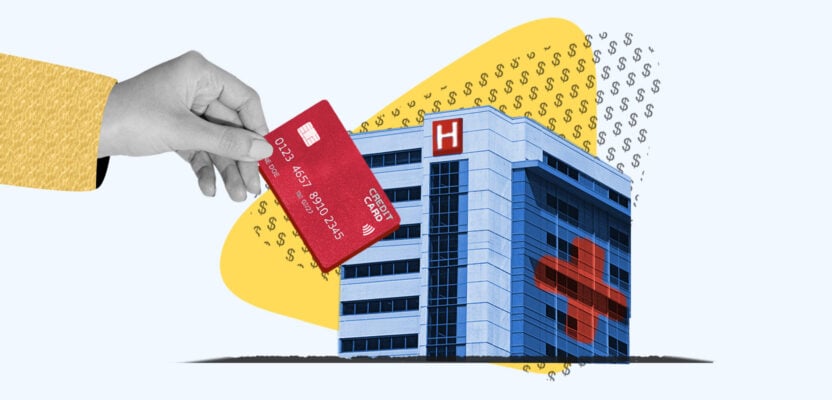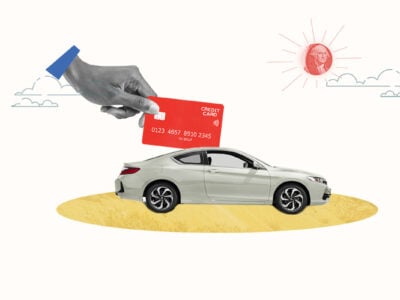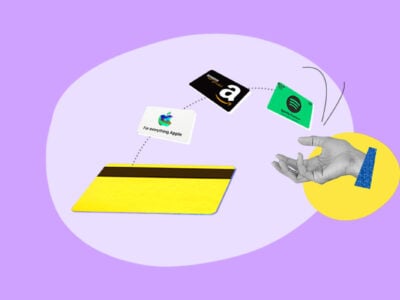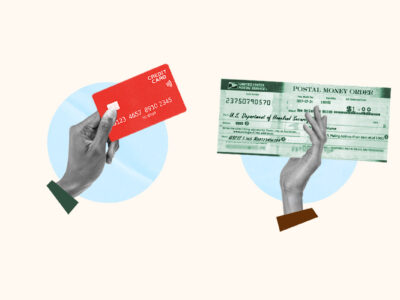If you’ve been hit with steep medical bills that you’re struggling to pay, you might be wondering whether you can just put them on your credit card. The answer is yes, you can, but don’t commit to paying that way just yet.
Paying off your health expenses with a credit card comes with serious downsides, and it’s best treated as an option of last resort. Read to learn what those downsides are and what other options you have.
Table of Contents
Can I pay my medical bills with a credit card?
Yes, you can pay medical bills with a credit card. Hospitals and healthcare providers accept credit card payments for medical treatment, including surgeries and other procedures, and may even offer their own specific credit cards to help you pay off the debt.
Paying medical debt with a credit card is actually fairly common. A 2021 Discover survey found that 41% of American consumers charged hospital bills and other healthcare expenses to their cards instead of relying on their health insurance. 1
However, even though this is common, it’s not always a good choice, at least if you have other options available to you.
What are the downsides of paying your medical bills with a credit card?
There are several serious downsides you should consider before paying your medical bills with a credit card:
Credit cards have high interest rates
Paying your medical bills with a credit card can become costly if you leave your balance unpaid for long.
Leaving a balance from one month to the next means you’ll accumulate interest charges. Credit cards have high interest rates, and because credit card interest is compounding, the charge will grow bigger and bigger every month you leave your bills unpaid. This can trap you in a spiral of debt that’s very hard to get out of.
A potential solution to this is to pay your medical bills using a 0% interest credit card. These cards offer 0% APR for a certain period of time, usually 6–18 months.
While you won’t accrue interest during this time, you’ll be charged interest—usually at a relatively high rate—after the introductory APR period has ended. So to make the most out of this card, open one right before you need to pay your medical bills, then pay off your full balance within the 0% APR timeframe.
Credit card debt is not negotiable
When you pay your medical debt on a credit card, it becomes regular credit card debt. This means you’ll be dealing with the credit card company instead of your medical provider, so you won’t be able to negotiate down your medical bill, which you’re sometimes able to do when dealing directly with hospitals and clinics.
Late payments will hurt your credit score
Adding medical bills to your credit card balance will increase your minimum monthly payment on your card. If the payment is too high and you’re unable to pay, you’ll face several consequences:
- You’ll get hit with late fees
- You may trigger a higher interest rate (known as a penalty APR)
- The late payment will be reported to the credit bureaus
The last point is particularly important. Getting a late payment on your credit report will hurt your credit, as late payments affect your credit score significantly.
By contrast, medical bills that you don’t pay with a credit card do not appear on your credit report unless they become so severely overdue that they’re charged off and sent to a debt collection agency. Even then, there will be a year-long (365-day) delay before they start to affect your score, during which time you can pay them off and protect your credit.
Incurring large balances on your card will hurt your credit score
Your credit score is also heavily affected by your credit utilization rate—the amount of your credit that you’re using. If you pay off a large medical bill with your credit card, your credit utilization rate will shoot up and your credit score will suffer, especially if you’re not able to pay your balance back down for a long time.
Not to mention, having a large outstanding balance on your card lowers your available credit. With less spending power, you increase your odds of going over your credit limit and having your credit card declined.
When should you use a credit card to pay your medical bills?
The best time to use a credit card for medical bills is when you’re confident that you can pay off your balance quickly.
Not only does this improve your credit score, but paying off your debts quickly ensures your interest charges stay low (or nonexistent).
If your medical bills are relatively small or you can get a 0% APR card and pay them off within the introductory period, then using your credit card may be a reasonable option.
When shouldn’t you use a credit card to pay off your medical bills?
If you don’t think you’ll be able to pay off your debt before incurring interest charges (or if you’re not sure how long it will take you to pay it off at all), it’s better to leave the debt off your credit card.
Most of the time, the best way to pay off your medical debt is to use a debit card, check, or cash so that you can avoid taking on new credit card debt.
The most important thing is to pay, negotiate, or resolve the balance quickly, otherwise your medical bill may be subject to interest and late fees. 2 Whichever method you use, make sure you do pay off your medical bills so they don’t end up in collections and damage your credit score.
What are the best credit cards for medical bills?
If you opt to use a credit card to pay your medical bills, choose one that’s specifically designed to help pay your medical expenses, like CareCredit credit cards. You can apply for medical credit cards online or through your healthcare provider.
Some of these credit cards reward you for paying your medical debt, and you may be eligible to earn points, cash back, travel miles, and other bonus offers. Note that if you can’t pay your bills or miss payments, the interest that you’ll accrue could cost a lot more than the rewards you’ll earn, so be careful.
As mentioned, there are also 0% APR credit cards for medical bills that offer no interest for 6–24 months. Just make sure you can commit to paying the bill in full within that period or you’ll begin to accrue interest and owe even more.
What are the other ways to pay medical bills?
There are alternatives to paying your medical bills with a credit card. These include the following:
Pay with health insurance
If you have health insurance, your insurer will pay your medical bills for you. Note that health insurance doesn’t typically cover everything, so make sure you understand your coverage before you make a claim.
You can call your insurer to clarify your insurance policy, and confirm how much you’re expected to pay out of pocket. Depending on your state and insurer, you’ll typically have 30–180 days to file a claim.
Negotiate with your healthcare provider
If you don’t have health insurance or your insurer won’t cover your expenses, you can try negotiating your bill with your healthcare provider. It’s often possible to negotiate a reduced amount for your medical bill, especially if you’re able to make a large down payment (or immediately pay off the reduced amount in full).
You can handle this negotiation yourself or hire a medical bill advocate to do it for you.
Work out a repayment plan
When negotiating your medical bill with your healthcare provider, you can also ask for a repayment plan. Many medical providers are willing to offer interest-free or low-interest payment plans, as long as you’re able to make consistent payments on your debt.
Note that if you’re granted an extended payment term, you may be charged additional fees or interest.
You can also apply for an income-driven repayment plan
There are specific repayment plans offered to those with low incomes, such as Medicaid, a federal state program that helps low-income families with their medical expenses. You can check your eligibility online.
Apply for an assistance program
Hospitals and medical providers also offer “financial assistance policy” or “charity care” programs that can significantly reduce your medical bills. Nonprofit hospitals are required by law to have these programs. Speak to your provider to see which ones you qualify for.
Depending on the state, some hospitals also give discounts to uninsured patients, and others set aside funds to help people who don’t qualify for assistance programs.
Get a personal loan
You can also pay off your medical bill with a personal loan if you have a good credit score and can qualify for one. Personal loans typically have lower interest rates than credit cards, and you can access the money immediately to pay off your debt.
Be sure to only take out a loan you can afford so you don’t miss payments and fall behind.






